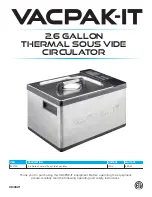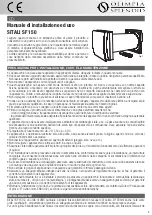
19
The weave bead
Used when you want to deposit metal over a wider space than would be possible with
a stringer bead. It is made by weaving from side to side while moving with the electrode. It is best to
hesitate momentarily at each side before weaving back the other way.
3.7.4 Welding position
Flat position
It is easiest of the welding positions and is most commonly used. It is best if you can weld
in the flat position if at all possible as good results are easier to achieve.
The horizontal position it is performed very much the same as the flat weld except that the angle is
different such that the electrode, and therefore the arc force, is directed more toward the metal above
the weld joint. This more direct angle helps prevent the weld puddle from running downward while still
allowing slow enough travel speed to achieve good penetration. A good starting point for your electrode
angle is about 30 degrees DOWN from being perpendicular to the work piece.
3.7.5 Judge the good weld bead
When the trick of establishing and holding an arc has been learned, the next step is learning how to run
a good bead. The first attempts in practice will probably fall short of acceptable weld beads. Too long of
an arc will be held or the travel speed will vary from slow to fast (see following)
A. Weld speed is too fast.
B. Weld speed is too slow.
C. Arc is too long.
D. Ideal weld.
A solid weld bead requires that the electrode be moved slowly and steadily along the weld seam.
Moving the electrode rapidly or erratically will prevent proper fusion or create a lumpy, uneven bead.
ELECTRIC SHOCK CAN KILL! To prevent ELECTRIC SHOCK, do not perform any welding while
standing, kneeling, or lying directly on the grounded workpiece.
Stringer Bead
Weave Bead
Flat Position
Horizontal Position







































